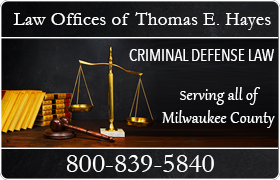Cudahy Felony Lawyer, Wisconsin
Sponsored Law Firm
-
 x
x

Click For More Info:
-
Law Offices of Thomas E. Hayes
161 W Wisconsin Ave Suite 3032 Milwaukee, WI 53203» view mapMilwaukee County Criminal Defense Over 30 Years of Experience
Clients should be comfortable with their lawyer. I am the only one who "works" my cases. My work ethic is efficient result oriented.
800-839-5840
FREE CONSULTATION
CONTACTFREE CONSULTATION
CONTACTDennis P. Coffey
Landlord-Tenant, Traffic, Immigration, Estate, Felony
Status: In Good Standing Licensed: 52 Years
Douglas J. Carroll
Employment, Child Support, Felony, Civil & Human Rights
Status: In Good Standing Licensed: 24 Years
James R. Donohoo
Divorce & Family Law, Criminal, Accident & Injury, Felony
Status: In Good Standing Licensed: 50 Years
FREE CONSULTATION
CONTACTJoseph Francis Fischer
Traffic, Employee Rights, Misdemeanor, Felony
Status: In Good Standing Licensed: 28 Years

 Thomas Hayes Milwaukee, WI
Thomas Hayes Milwaukee, WI Contact UsRequest Consultation Now
Contact UsRequest Consultation Now Law OfficeLaw Offices of Thomas E. Hayes
Law OfficeLaw Offices of Thomas E. Hayes
